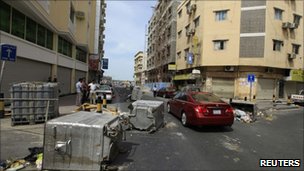Bahrain king declares state of emergency after protests
The BBC's Caroline Hawley says Manama's financial district is now a no-go zone
The king of Bahrain has declared a three-month state of emergency, state TV reports, following weeks of pro-democracy protests in the kingdom.
It comes a day after troops from neighbouring Gulf states were sent to Bahrain to help deal with the unrest.
Protesters have blocked all roads leading to the capital's financial centre, the scene of clashes on Sunday that left more than 200 people wounded.
At least two people have been killed in Tuesday's clashes, reports say.
One is reported to be a member of the Bahraini security forces killed in clashes with thousands of protesters in Maamee, state television and the information ministry said.
Another Bahraini was also killed in clashes in nearby Sitra, reports said.
“Start Quote
End Quote Bahraini doctorThe paramedics were kicked out, and they took the ambulances. They went everywhere in them and they were shooting people”
A Bahraini doctor who was at the accident and emergency department at one hospital told the BBC that there were "many, many casualties".
"People are coming in with bullet wounds and injuries caused by rubber bullets. There are hundreds of people," he said. "We received one major case - a man whose skull had been split open by something."
Two other men were in a serious condition after being shot in the eyes, while a third had been shot in the back of the head, the doctor said.
"We were at the health centre in Sitra, and they shot at us. The doctors and nurses were all scared because the windows were being broken and we could hear the shooting. This is a disaster," he added.
He said police and soldiers - both Bahraini and foreign - had seized six ambulances, and then used them to attack protesters.
"The paramedics were kicked out, and they took the ambulances. They went everywhere in them and they were shooting people."
'All measures'Not including the deaths on Tuesday, seven people have been killed since the start of the protests a month ago.
“Start Quote
End Quote Tommy Vietor US National Security Council spokesmanThe use of force and violence from any source will only worsen the situation”
The nation's armed forces chief has been authorised to take all measures to "protect the safety of the country and its citizens", the emergency law announcement said.
About 1,000 troops from Saudi Arabia and a further 500 from the United Arab Emirates deployed in Manama, the capital, on Monday at the invitation of the government.
It is believed they intend to guard key facilities such as oil and gas installations and financial institutions.
The White House called on Bahrain to find a political rather than military solution to its problems. "The use of force and violence from any source will only worsen the situation," National Security Council spokesman Tommy Vietor said.
The US has sent a senior diplomat, Assistant Secretary of State Jeffrey Feltman, to Bahrain to encourage talks between the government and opposition.
The US state department has urged its citizens to avoid travelling to Bahrain due to the ongoing unrest.
BarricadesThe protesters are demanding widespread political reforms in the kingdom.
 Protesters have tried to barricade roads to prevent riot police from entering
Protesters have tried to barricade roads to prevent riot police from entering
The country's Shia opposition alliance wants a constitutional monarchy and other democratic reforms, but other groups want to bring down the Sunni dynasty.
Bahrain's Shia Muslim majority has long complained of discrimination and dominance by the Sunni minority, including the ruling royal family.
Iran - the main Shia power in the Gulf - has denounced the use of troops from neighbouring Gulf states in Bahrain as "unacceptable".
"The presence of foreign forces and interference in Bahrain's internal affairs is unacceptable and will further complicate the issue," said Iranian Foreign Ministry spokesman Ramin Mehmanparast.
In turn, Bahrain has recalled its ambassador to Iran in protest at Tehran's "blatant interference" in its internal affairs, the state news agency reported.
Some in the Gulf region fear Iran, as a Shia-majority country, will try to inspire or organise the anti-government protesters; but many analysts believe the Shia majority in Bahrain is simply campaigning for better civil and political rights - and has no desire to be dominated by Iran, says the BBC's Tehran correspondent James Reynolds, who is based in London.
MarchIn the financial district of Manama, demonstrators have built barricades from upturned rubbish bins, says the BBC's Caroline Hawley in the capital, and many are wearing masks to protect themselves from tear gas.
The Shia-led opposition has said the arrival of Gulf states troops - the first time that any Arab government has called for outside military help during the current wave of protests sweeping the region - is tantamount to a declaration of war.
The troops are part of a deployment by the Gulf Co-operation Council, a six-nation regional grouping which includes Bahrain, Saudi Arabia, Kuwait, Oman, Qatar and the United Arab Emirates.
Thousands of Bahraini protesters marched towards the Saudi embassy on Tuesday, waving banners and chanting slogans against the king, the AFP news agency reported.
They also called for unity between Sunnis and Shias in the Shia-majority country, which has been ruled by a Sunni dynasty for more than 200 years.
The G8 powers hope to see a democratic transition in the kingdom, said French Foreign Minister Alain Juppe, who has been hosting a meeting of G8 foreign ministers in Paris.
Earlier, the European Union urged "utmost restraint" in Bahrain and called on security forces to respect the "right to assemble peacefully".



 Libya rebels to export first oil
Libya rebels to export first oil Ivorian leader in surrender talks
Ivorian leader in surrender talks 'Insurgents defeated'
'Insurgents defeated' Flight whitewash
Flight whitewash 'Cops without badges'
'Cops without badges' Day in pictures
Day in pictures Lean and mean
Lean and mean  Fast Track
Fast Track